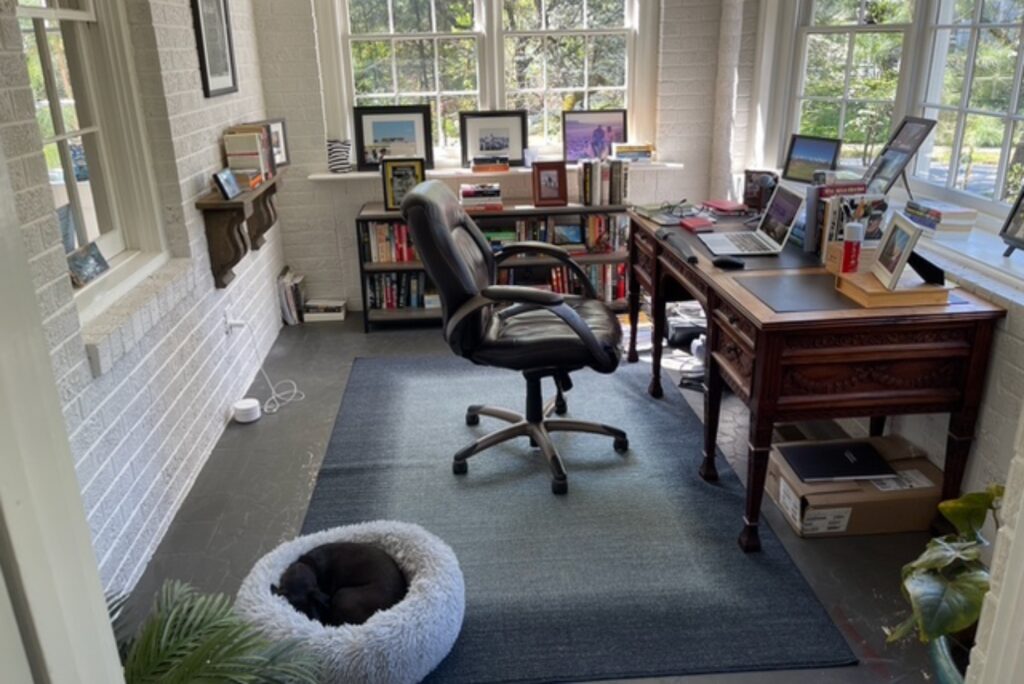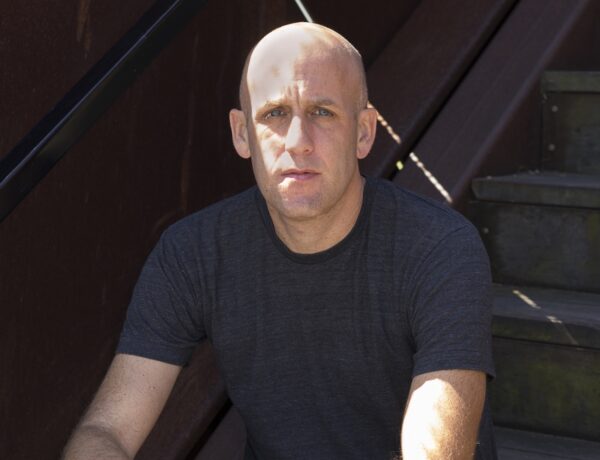Kevin Hazzard is an accomplished journalist, television writer, and former paramedic based in Atlanta. He made his literary debut in 2016 with A Thousand Naked Strangers: A Paramedic’s Wild Ride to the Edge and Back, a riveting account of his experiences in emergency medical services.
He now writes for film and TV, with work produced by Hulu, CBS, ABC, and Universal. His journalism has been published at 99% Invisible, The Atavist Magazine, Men’s Journal, Creative Loafing, Atlanta Magazine, and elsewhere. He does medical relief work through Global Response Medicine and is a sought-after voice on emergency medicine.
Looking for inspiration to help you achieve your writing goals? Subscribe to our newsletter for exclusive insights into the routines, habits, and techniques of some of the most celebrated authors in history.
Hi Kevin, we’re delighted to have you as a guest on Famous Writing Routines. For our readers who may not be familiar with your work, could you please give us a brief introduction to yourself?
I’m Kevin Hazzard. I’m a journalist and writer and a former paramedic. I left home when I was young and have since lived all over the country, which is fantastic but also leaves me feeling a bit rootless at times. Luckily, I have writing and it’s this daily force that holds me in place.
You have a background in journalism and now write for film and TV. How do you approach writing for different mediums and how does your background in journalism influence your writing for film and TV?
Ultimately, I approach them the same way. I’m always looking for interesting people whose varied motivations have led them to unexpected places. When I find that, I know I’ve got the kind of story I write—whether it’s truth or fiction. TV writing is so heavily focused on this, character and motivation, that it’s helped me to dig that extra inch in my other writing and it’s always that extra inch, that one question you ask after you think you’ve already got all the answers, that so often makes the difference.
Your first book, A Thousand Naked Strangers: A Paramedic’s Wild Ride to the Edge and Back, is a memoir about your experiences as a paramedic. Can you share with us your experience of putting together the book and getting it published?
I had no agent at the time I wrote it and if history was any guide, I had no chance of getting one and certainly no shot of getting that book published. But it was a story that’d been bouncing around in my head for some time and I knew nothing quite like it had been written and so I forged on, even though, like I said, I wasn’t at all sure it would land anywhere. But it poured out of me, as the good ones tend to do, and when I was finished I was really proud of it. And determined. I really felt this would be the one.
So I focused all my energies on getting an agent. I went to every bookstore within driving distance, went to the memoir section and flipped to the acknowledgements page. Most writers thank their agents and so each book gave me a name. I wrote them down and created a pitch that essentially said I’d recently read X book by Y author and since it’s similar to the book I just wrote, I thought that agent might be interested in my manuscript too. I sent out 20 a week and after a couple weeks I landed my agent. An agent is really the person who sells a manuscript to a publisher, so she took it from there and carried us across the finish line.
Can you tell us about your experience in medical relief work through Global Response Medicine and how it has influenced your writing and perspective on emergency medicine?
Honestly, though you can see terrible things in medicine, especially disaster medicine, it’s renewed my faith in humanity. People get into that line of work because they genuinely want to help. Even the tough, grizzled former special forces guys who you assume are just mercenaries or adventurers, they’re often caring people with a true sense of service, a need to serve. It’s hard to be around people who dedicate their lives, sometimes at great personal risk, to helping total strangers and not see the beauty in humanity. Knowing so much good is in so many people, it would be hard to write something cynical.
How do you balance writing for different audiences and publications, from 99% Invisible to Men’s Journal?
I assume they’ve come to me because they appreciate my voice and so no matter what I’m doing, I always do it in my own voice. I’m the only writer I can be.
Discover the daily writing habits of authors like Stephen King, Neil Gaiman, and Gillian Flynn with Famous Writing Routines Vol. 1 and learn how to take your writing to the next level. Grab your copy today!
I’d love to learn more about your writing routine? How do you structure your days to make time for the creative process? Maybe take us through a recent writing day if you could.
For me, the morning is best. I love to get up early. My mind is clear in the morning and I feel creatively alive before most of the world is awake. I’ll get up at four am to get some work in before my kids get out of bed. Then I take a break and dive back into it in the late morning. I try to take a break if I feel myself flagging, though if I know exactly where I’m going I’ll just keep on pushing until I get there. Exercise really helps with focus. So I’ll workout between 11 and noon, then have lunch and get back to work.
My kids get home from school around 3 so I have until then to be alone and focused. Once they get back my attention is pulled in a bunch of different directions. But I usually take time in the afternoon to tweak a sentence or two, maybe to read over what I wrote that day to see if it’s any good. But my attention begins to flag in the late afternoon and that darkens my perspective on what I’ve written. Sometimes I’m too harsh on the work late in the day and when I feel that, when I’m annoyed and totally uninspired by what I’ve written, I walk away. Either it’s bad and I’ll rewrite it tomorrow or it’s good and I’m just not in the mood to go on right now. Either way, writing is hard enough, no need to flog yourself unnecessarily.
Can you talk about any specific tools or techniques you use to help with your writing routine, such as writing apps or brainstorming methods?
I don’t really use any. If I feel stuck I go for a walk. I’ve learned that you’re going to get stuck at various times in anything, regardless of how long or how simple the piece is. So when it happens, I don’t freak out. I just try to methodically work my way through it.
How do you handle writer’s block and maintain creativity in your writing?
I haven’t had writer’s block since way back in the beginning. I’m not exactly sure what used to cause it. Though, I write every day now and maybe that’s how I’ve avoided it for so long—routine and structure. I’ve found that if I’m working on something every day, my mind is in it and I’m thinking about it all the time. Little bits and pieces of the story keep falling into place, sometimes by accident.
A line or an idea will pop into my head. That keeps me going. It’s the opposite if I’m not working every day. Vacations can really kill the momentum because when I return I have to get into it all over again. Usually, I just go back and read what I’ve done and, little by little, the story takes over again. Immersion. That’s what works for me.
What does your writing workspace look like?
It’s full of books. There are two bookshelves stacked with books and more books lined on the desks and windowsills. I have several large plants. I love houseplants. I don’t know why. There are a lot of windows, plenty of light. It’s full but not cluttered. I’m very much affected by weather and aesthetics. I’m at my best when it’s clear and I’m in a place of beauty. I do my best to create that kind of atmosphere in my office.

Affiliate disclaimer: Some links on this website are affiliate links. We may earn a small commission if you make a purchase through these links, but only promote products we truly believe in. We disclose affiliate links and give honest reviews.



No Comments